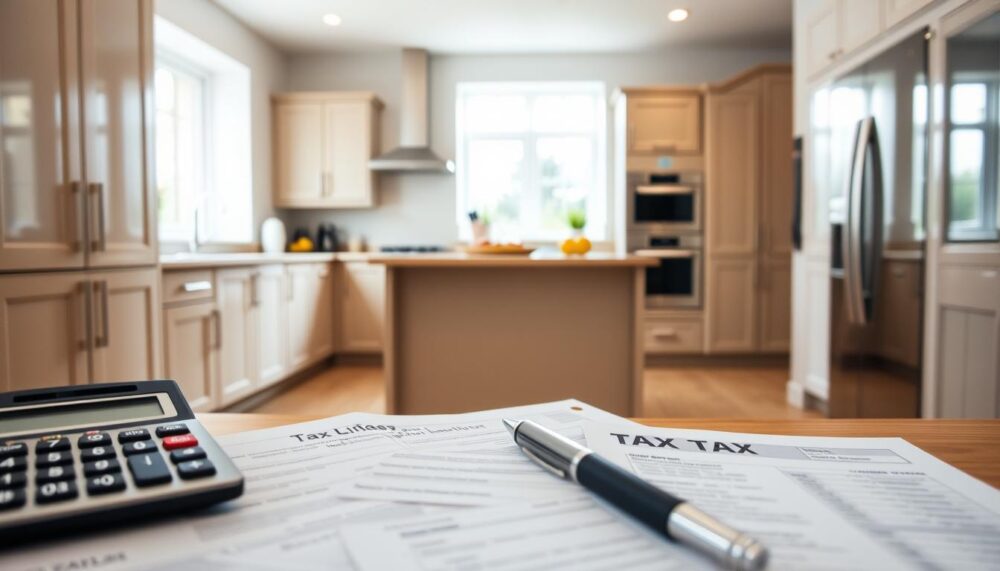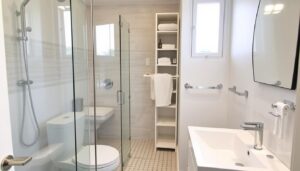Many UK homeowners wonder about potential tax relief when upgrading their living spaces. A common question involves whether kitchen work qualifies for any financial benefits.
While most personal home improvements aren’t directly deductible, specific circumstances might offer partial relief. HMRC outlines particular situations where these expenses could receive consideration.
Three main scenarios could potentially qualify: energy efficiency upgrades, medical necessity modifications, and business use of the space. These situations differ significantly from standard personal renovations.
Capital improvements to your property can increase its cost basis. This adjustment might reduce capital gains tax obligations when selling your home in the future.
Understanding the difference between repairs and improvements is crucial. Repairs maintain current condition, while improvements add value or extend lifespan.
Proper documentation and professional advice remain essential for any potential claims. The rules apply equally to houses and apartments meeting qualifying criteria.
Ready to Transform Your Kitchen?
AVO Renovations delivers expert kitchen installations across Edinburgh
✔ Free consultation ⭐ Rated 5/5 ✔ Projects delivered on time
Key Takeaways
- Kitchen remodels are not typically fully tax deductible for personal residences
- Partial deductions may apply for energy efficiency improvements
- Medical necessity modifications could qualify for specific relief
- Business use of kitchen space might offer different tax treatment
- Capital improvements can affect future capital gains tax calculations
- Proper documentation is essential for any potential claims
- Professional tax advice is recommended for homeowners considering renovations
Can You Claim a Kitchen Renovation on Your Taxes? The Direct Answer
Many property owners seek clarity regarding potential financial advantages from home upgrades. Understanding HMRC’s position helps determine eligibility for any relief.
The General Rule: Capital Improvements vs. Repairs
HMRC makes a crucial distinction between two types of expenditure. Capital improvements enhance your property’s value or extend its lifespan. Repairs simply maintain the existing condition without adding significant worth.
Examples of capital improvements include installing energy-efficient appliances or custom cabinetry. Structural modifications like removing walls also qualify. These enhancements potentially affect your property’s cost basis.
Repairs involve fixing leaky taps or replacing broken units. These actions restore functionality without creating substantial value increases. They typically receive different tax treatment.
| Capital Improvements | Repairs |
|---|---|
| Add measurable value | Maintain current state |
| Extend property lifespan | Address immediate issues |
| Affect cost basis | No basis adjustment |
| Potential future tax benefits | Typically no tax advantages |
When a Kitchen Renovation Becomes More Than a Personal Expense
Certain situations transform ordinary upgrades into potentially qualifying expenditures. Medical necessity modifications represent one such scenario. Expenses exceeding 7.5% of adjusted gross income might qualify for specific relief.
Business use of kitchen space requires exclusive business-purpose designation. This means regular and exclusive use for business activities. Meeting these strict requirements allows different tax treatment.
Labour costs for improvements contribute to capital basis calculations. They aren’t immediately deductible unless part of energy-efficient upgrades. Repairs bundled with larger projects might receive partial benefits.
Understanding these distinctions proves essential for determining potential advantages. Proper documentation supports any future claims regarding your property’s value.
Understanding the Tax Jargon: Deductions, Credits, and Cost Basis
Tax vocabulary comprehension enables smarter financial decisions regarding residential improvements. Three key concepts deserve particular attention when evaluating potential advantages.
These financial mechanisms operate differently and offer varying levels of benefit. Understanding their distinctions helps homeowners make informed choices about property enhancements.
How a Tax Deduction Lowers Your Bill
A tax deduction reduces your taxable income rather than directly cutting your tax bill. The actual savings depend entirely on your marginal tax bracket.
For example, a £1,000 deduction saves £200 for someone in the 20% bracket. Higher-rate taxpayers enjoy greater proportional benefits from these reductions.
Home improvements typically qualify as capital expenditures rather than immediate deductions. They contribute to your property’s overall value rather than providing current-year benefits.
Why a Tax Credit is More Valuable
Tax credits provide pound-for-pound reductions in your actual tax liability. Unlike deductions, they’re not dependent on your income level.
Energy-efficient upgrades often qualify for specific credit programmes. These schemes might cover up to 30% of qualifying costs with annual limits.
As one financial expert notes:
“Tax credits deliver immediate financial relief regardless of income level, making them particularly valuable for middle-income homeowners.”
How Renovations Capitalise Your Home’s Cost Basis
The cost basis represents your property’s original value plus qualifying capital improvements. This figure becomes crucial when calculating potential capital gains upon sale.
A higher basis reduces your taxable gain, potentially keeping you within annual allowances. Individuals enjoy £12,300 in tax-free gains, while married couples receive £24,600.
Consider these examples of basis-increasing improvements:
- Installing energy-efficient appliances
- Adding custom cabinetry or storage solutions
- Structural modifications enhancing functionality
- Upgraded flooring or countertop materials
Proper documentation proves essential for basis adjustments. Receipts, contracts, and before-and-after photographs support your claims during property transactions.
Medical necessity modifications follow different rules. Expenses exceeding 7.5% of adjusted gross income might qualify for specific relief programmes.
Consulting a qualified professional remains advisable due to these concepts’ complexity. Their guidance ensures proper handling of your particular financial situation.
Specific Scenarios for Kitchen Renovation Tax Benefits
Certain kitchen improvement projects might qualify for financial advantages under specific circumstances. These opportunities arise when upgrades serve purposes beyond personal enjoyment.
Energy Efficiency Upgrades and Federal Tax Credits
Energy-efficient improvements often receive favourable tax treatment. Installing Energy Star-rated appliances represents one qualifying category.
Efficient HVAC systems, windows, doors, and insulation also qualify. These upgrades might earn credits covering up to 30% of project costs.
Annual limits apply to these energy credits. Homeowners can claim them across multiple years for ongoing improvement projects.
Specific examples include:
- Energy-efficient refrigerators and dishwashers
- Improved insulation around kitchen spaces
- High-efficiency ventilation systems
- Energy-saving lighting installations
Renovations for Medical Necessity
Medical modifications receive different tax consideration. Wheelchair-accessible countertops and special fixtures might qualify.
These expenses must exceed 7.5% of adjusted gross income. The deduction applies only to costs that don’t increase property value.
Proper documentation proves essential for these claims. Medical professional certification often supports the necessity argument.
As one tax advisor explains:
“Medical modifications require careful documentation showing medical necessity rather than personal preference.”
Using Your Kitchen for Business Purposes
Business use transforms ordinary kitchen spaces into potential deduction sources. Ghost kitchens and food blogs represent common examples.
The space must serve exclusive business purposes regularly. This requirement means no personal use during business hours.
Qualifying deductions might include both direct expenses and proportionate household costs. These cover equipment, utilities, and maintenance expenditures.
Business use requirements include:
- Regular and exclusive business activity
- Principal place of business designation
- Detailed records of business use percentage
- Separate business and personal expense tracking
All scenarios demand meticulous documentation through receipts and records. Specific HMRC forms often accompany these specialised claims.
How to Claim Tax Benefits on Your Kitchen Renovation
Successfully securing financial advantages requires careful preparation and documentation. Following proper procedures ensures your eligibility for potential relief programmes.
Step 1: Maintain Meticulous Records and Receipts
Comprehensive documentation forms the foundation of any successful claim. Keep all invoices, contractor agreements, and material cost receipts organised.
Energy efficiency upgrades require Energy Star certifications. Medical modifications need supporting doctor’s notes explaining necessity.
Business use demands proof of exclusive commercial purpose. Digital copies are acceptable provided they remain legible and complete.
Retain these records for at least six years after filing. This practice offers crucial audit protection if questions arise later.
Step 2: Utilise the Correct HMRC Forms
Different scenarios require specific documentation forms. Energy efficiency claims use different paperwork than medical necessity submissions.
Business deductions involve separate schedules and supplementary forms. Completing these accurately proves essential for approval.
Professional guidance helps identify the appropriate forms for your situation. Their expertise prevents costly filing errors.
Step 3: Consult a Qualified Tax Professional
Expert advice makes navigating complex regulations significantly easier. Tax specialists understand renovation-related deductions thoroughly.
They identify all eligible benefits, including less obvious opportunities. Partial business use scenarios particularly benefit from professional input.
As one experienced advisor notes:
“Proper documentation combined with professional guidance transforms potential benefits into actual savings.”
Following these steps carefully distinguishes successful claims from rejected submissions. Meticulous preparation ultimately determines your financial outcome.
Conclusion
Strategic planning transforms kitchen upgrades into potential financial advantages. Partial benefits exist for energy efficiency, medical necessity, and business use scenarios.
Capital improvements increase your property’s cost basis, reducing future capital gains tax obligations. Meticulous documentation throughout the project proves essential for successful claims.
Professional tax advice remains highly recommended due to complex regulations. These rules apply equally to houses and apartments meeting qualifying criteria.
Early consultation with specialists helps maximise available benefits. Proper planning and thorough record-keeping ultimately determine your financial outcome.
FAQ
Is a kitchen renovation tax deductible for UK homeowners?
Generally, no. The costs of renovating your private residence’s kitchen are considered personal expenses and are not deductible. However, specific exceptions exist if the work is for medical needs, energy efficiency, or business use.
What is the difference between a capital improvement and a repair?
A capital improvement adds value to your property or prolongs its life, like installing new units. A repair simply maintains its current condition, such as fixing a broken door. This distinction is crucial for tax purposes.
Can I claim a tax credit for an energy-efficient kitchen upgrade?
While there isn’t a general kitchen-specific scheme, certain energy-saving products like approved insulation can qualify for relief. It’s best to check the government’s list for any current programmes that might apply to elements of your project.
What if I need a new kitchen for medical reasons?
If a medical professional recommends specific adaptations, such as lower worktops for accessibility, those costs may be considered allowable expenses. You should keep a detailed letter from your doctor and all related receipts.
How does renovating my kitchen affect Capital Gains Tax when I sell?
The money you spend on qualifying capital improvements is added to your property’s original purchase price. This increases your ‘cost basis,’ which can reduce your potential taxable profit when you eventually sell your home.
What records should I keep for a kitchen renovation?
Maintain a dedicated folder with all invoices, receipts, and bank statements. For any work related to a potential claim, also keep any supporting documents, like a doctor’s note for medical adaptations or product specifications for energy-efficient items.
Should I speak to a professional about my kitchen renovation and taxes?
Absolutely. Tax rules are complex and change frequently. Consulting a qualified accountant or tax adviser is the best way to understand if any part of your project qualifies for relief and to ensure you complete your return correctly.






